|
|
|
Sort Order |
|
|
|
Items / Page
|
|
|
|
|
|
|
| Srl | Item |
| 1 |
ID:
152944
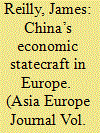

|
|
|
|
|
| Summary/Abstract |
China’s economic statecraft in Europe relies upon three distinct strategies: specific and diffuse reciprocity, and strategic engagement—each designed to advance a specific type of policy objective. However, the tensions between a reciprocity and engagement strategy have undermined China’s efforts to reassure Europeans of Beijing’s benevolent intent. This article compares Beijing’s three strategies through case studies of China’s efforts to discourage European receptions of the Dalai Lama, secure market economy status, and Beijing’s response to Europe’s post-2009 financial crisis.
|
|
|
|
|
|
|
|
|
|
|
|
|
|
|
|
| 2 |
ID:
134700
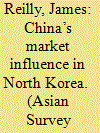

|
|
|
|
|
| Summary/Abstract |
North Korea’s deepening economic interactions with China have encouraged the former’s localized trends toward a more market-oriented and externally engaged society. This article compares China’s engagement strategy to South Korea’s “Sunshine Policy” and then assesses China’s transformational influence on North Korean institutions, cross-border cooperation, businesspeople, and consumers.
|
|
|
|
|
|
|
|
|
|
|
|
|
|
|
|
| 3 |
ID:
141102
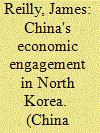

|
|
|
|
|
| Summary/Abstract |
Since 2005, central Chinese leaders have successfully encouraged local governments and commercial actors to expand their economic interactions with North Korea. However, the resulting expansion in commercial actors and economic interactions has intensified a principal-agent dilemma for Chinese leaders, exacerbating diplomatic tensions, eroding border security, and undermining popular support for Beijing's engagement strategy. In comparison with China's other neighbours, North Korea presents both a difficult case for stimulating economic engagement and a relatively easy case for enforcement. These dynamics are even more likely to emerge across China's 13 other land neighbours.
|
|
|
|
|
|
|
|
|
|
|
|
|
|
|
|
| 4 |
ID:
074899
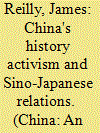

|
|
|
|
|
| Publication |
2006.
|
| Summary/Abstract |
This essay explores the emergence and impact of populist "history activism" in China. History activism includes museums and academics documenting Japanese wartime atrocities in China, the redress movement demanding compensation for Chinese victims and popular protests against Japan over a range of issues. While the Chinese state played a central enabling role in the emergence of history activism in the early 1990s, activists have subsequently mobilised popular sentiments, lobbied for official support and exacerbated tensions between China and Japan.
|
|
|
|
|
|
|
|
|
|
|
|
|
|
|
|
| 5 |
ID:
051991
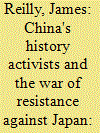

|
|
|
|
|
| Publication |
Mar-Apr 2004.
|
|
|
|
|
|
|
|
|
|
|
|
|
|
|
|
| 6 |
ID:
116619
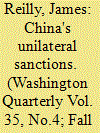

|
|
|
|
|
| Publication |
2012.
|
| Summary/Abstract |
China's opposition to economic sanctions is legendary. Beijing has repeatedly leveraged its permanent seat in the UN Security Council to criticize, ameliorate, and on rare occasions veto UN economic sanctions such as against Myanmar (2007), Zimbabwe (2008), and Syria (2011 and 2012). Unilateral sanctions by the United States come in for particular criticism. Chinese Foreign Ministry spokesperson Hong Lei recently said that "China is against one country putting their domestic laws above international law and placing unilateral sanctions on another country."1 This familiar rhetoric, however, masks a subtle but significant shift in China's own use of economic sanctions. With the world's largest capital surplus and its second largest economy, a highly coveted domestic market, and a currency with growing regional appeal, Chinese strategists are exploring new ways to deploy China's own economic might for strategic benefit.
|
|
|
|
|
|
|
|
|
|
|
|
|
|
|
|
| 7 |
ID:
136549
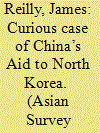

|
|
|
|
|
| Summary/Abstract |
Nowhere is China’s aid program both more important and yet less understood than with North Korea. This article examines two puzzles: China’s aid to North Korea coexists with a discriminatory trading relationship, and China continues to provide aid even as it tightens economic sanctions on North Korea’s nuclear program.
|
|
|
|
|
|
|
|
|
|
|
|
|
|
|
|
| 8 |
ID:
105339
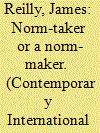

|
|
|
|
|
| Publication |
2011.
|
| Summary/Abstract |
As China expands its official development assistance (ODA) in Southeast Asia, is Chinese aid beginning to emulate international norms and practices or instead establishing its own distinct approach to development assistance? This essay argues that China's socialization into international norms varies with the thickness of the institutional environment. In Cambodia and Laos, China's aid program shows signs of alignment with international aid practices. At the regional level, however, China is beginning to act more like a norm-maker. Through expanding its financial support for select regional initiatives, Beijing is bolstering its ability to shape the norms and practices of regional developmental institutions. China's rising ODA in Southeast Asia poses a potential challenge to Australia's influence in the region, but also provides opportunities for greater diplomatic engagement and cooperation in support of regional development.
|
|
|
|
|
|
|
|
|
|
|
|
|
|
|
|
| 9 |
ID:
110072
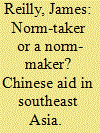

|
|
|
|
|
| Publication |
2012.
|
| Summary/Abstract |
As China expands its development assistance in Southeast Asia, is Chinese aid beginning to emulate international norms and practices or sustaining its own distinct approach to development assistance? This essay argues that China's socialization into international norms varies with the thickness of the institutional environment. In Laos and Cambodia, China's enhanced collaboration with international consortia, improved transparency, and project diversity point to nascent socialization. China's aid to Myanmar, however, remains opaque and largely self-interested. At the regional level, Beijing is bolstering its influence over the norms and practices of regional developmental institutions.
|
|
|
|
|
|
|
|
|
|
|
|
|
|
|
|
| 10 |
ID:
103321
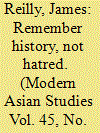

|
|
|
|
|
| Publication |
2011.
|
| Summary/Abstract |
Chinese leaders have repeatedly insisted upon the contemporary relevance of the 'War of Resistance to Japan' (1937-1945). However, the content of the official history of the war and the lessons drawn from it have changed dramatically from 1949 through 2010. This paper begins by reviewing theories of collective remembrance and then covers four historical periods: China's 'benevolent amnesia' on Japan's wartime atrocities before 1982; China's patriotic education campaign from the mid-1980s; the rise of history activism in China in the late 1990s; and the post-2005 reversal in official rhetoric on Japan and the wartime past. It concludes that, while the party-state retains an impressive capacity to shape the narratives of critical periods of modern Chinese history, Chinese leaders are likely to find themselves increasingly constrained by domestic forces and by external events beyond their control.
|
|
|
|
|
|
|
|
|
|
|
|
|
|
|
|
| 11 |
ID:
017635
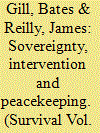

|
|
|
|
|
| Publication |
2000.
|
| Description |
p 41-60
|
|
|
|
|
|
|
|
|
|
|
|
|
|
|
|
| 12 |
ID:
076852
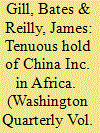

|
|
|
|
|
| Publication |
2007.
|
| Summary/Abstract |
China’s constructive approach with Africa fits squarely within its global strategy to promote China as a peacefully developing and responsible rising power seeking a harmonious world. China does look to Africa’s resources to fuel China’s growth. More broadly, however, Beijing seems to sense that Africa is on the verge of an economic and political renaissance. It wants to get in on the ground floor and be an integral and valued part of that transformation.
Within that broader strategy, China’s “corporate engagement” strategy in Africa consists of several elements. Top Chinese leaders and diplomats create a favorable environment for Chinese investment in Africa through a mixture of prestige diplomacy, economic assistance, and diplomatic support for African leaders. At home, China’s economic bureaucratic agencies encourage Chinese state-owned enterprises (SOEs) to increase their investment and trade with Africa. China’s SOEs implement Beijing’s aid projects, extract strategic natural resources for export back to China or for profit in the international marketplace, and expand their manufacturing bases in China. Chinese workers staff Chinese projects efficiently and at low cost, and Chinese migrants build trade networks and supply chains linking China and Africa. At least, that is the idea.
Since 2000, this impressive policy push has rapidly advanced China’s core strategic, economic, and diplomatic objectives in Africa. Chinese corporations have secured long-term access to key strategic resources. Economic policymakers have leveraged ties to the continent to build a more globalized network of large transnational corporations. The prospects for economic growth and investment have encouraged African leaders to support China’s broader diplomatic effort to portray itself as a peacefully rising power interested in “win-win” solutions and have helped lure African capitals to drop official ties with Taipei in favor of diplomatic relations with Beijing.
Most analysts, however, tend to exaggerate the prospects of China’s corporate engagement in Africa. As it deepens, the Chinese government will more likely find itself hamstrung by what theorists call a powerful “principal-agent” dilemma: an increasing set of tensions and contradictions between the interests and aims of government principals—the bureaucracies based in Beijing tasked with advancing China’s overall national interests—and the aims and interests of ostensible agents—the companies and businesspersons operating on the ground in Africa.
As China’s Africa strategy depends on an ever-increasing number of bureaucratic principals and corporate agents, contradictions between them will likewise increase. There is already ample and growing evidence of Chinese corporations and entrepreneurs taking steps that are at odds with Chinese government interests, creating problems for Beijing’s attempts to promote a positive and constructive image for Chinese engagement in Africa. Looking ahead, Beijing’s ability to rely on its corporate agents to dependably advance its strategic, economic, and diplomatic interests in Africa will further erode. This in turn will likely present new challenges to China’s global influence and overall soft-power strategy.
|
|
|
|
|
|
|
|
|
|
|
|
|
|
|
|
| 13 |
ID:
128270
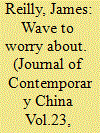

|
|
|
|
|
| Publication |
2014.
|
| Summary/Abstract |
Comparing China's 2012 anti-Japan protests against three previous rounds of anti-Japan protests in 1985, 1996 and 2005 reveals a cyclical pattern, best characterized as a wave of popular mobilization. In each case, external events sparked a swell of public anger and activism which Chinese leaders initially tolerated before cooling. This pattern of contained contention has not led to Beijing loosening control over its foreign policy. However, the 2012 protests did feature one new element: a consumer boycott augmented by China's more assertive economic statecraft.
|
|
|
|
|
|
|
|
|
|
|
|
|
|
|
|
|
|
|
|
|